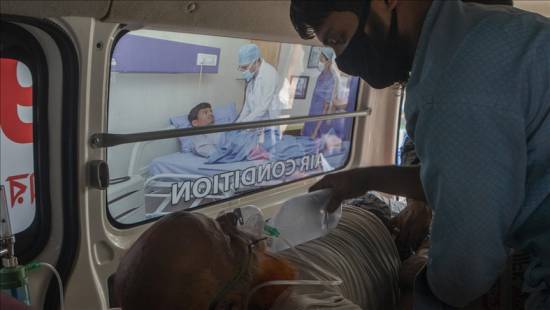Bangladesh on Sunday registered 119 coronavirus-related deaths, the biggest single-day jump since the pandemic hit the country, prompting caution calls from experts as the third wave has unfolded.
The nationwide death toll rose to 14,172 in the south Asian country of 165 million while the death rate further rose to 1.60%, according to the Directorate General of Health Services (DGHS).
A further of 5,268 people tested positive in the past 24 hours, taking the caseload to 888,406 with a steady rise in the infection rate of 21.59%, the DGHS said.
Meanwhile, experts have warned that a third wave has already spread in the country, and the deadly virus has begun to peak in some parts of border districts along with India. The Delta variant is dominating new infections as it is two times more transmittable, according to global experts.
Mushtaq Hossain, a virologist and chief advisor at government-run Institute of Epidemiology Disease Control and Research, told Anadolu Agency that a third wave has already unfolded, infections spreading at double pace.
“We have been recording over 20% positivity in overall daily COVID-19 infections for over a week which is among signs of a new wave. We thought we were passing the second wave, but with the new spike in deaths, we have encircled the third wave.”
People started returning from villages following the Muslim religious festival of Eid-al-Fitr. They entered Bangladesh from India despite a border lockdown.
Meanwhile, the government on Sunday issued a circular imposing a three-day lockdown after it reviewed its previous decision to ban public transport to and from the capital Dhaka which prompted thousands of people, particularly low- and temporary-income groups, to leave the city.
Huge rushes were reported at the ferry terminals and exit points of the capital city. People were seen moving to villages taking small vehicles, risking their lives as the government has already restricted long-route public transportation.
“We can’t force those people to stay in Dhaka as they are low- and temporary-income groups and they would not bear the living cost during the lockdown. We have our limitations in the economic arrangement and framework for those people,” the virologist observed.
This rush risks further transmission and spread of the virus across the country, he added.
The government in its new decision said a “harder lockdown” would come into effect from Thursday for a week and it might further extend the lockdown period depending on the COVID-19 situation, according to officials./aa
Additional Info
- عنوان تمهيدي: Bangladesh: Nearly 120 deaths recorded in last 24 hours, government announces ‘harder lockdown’ as of Thursday amid surging infections


